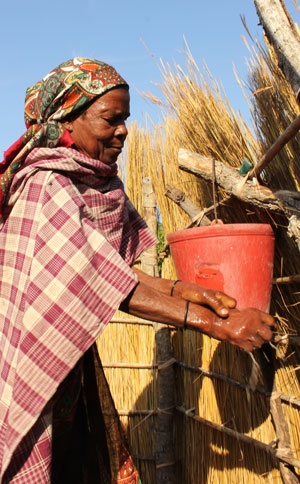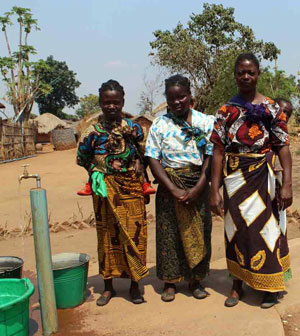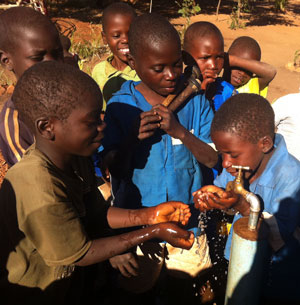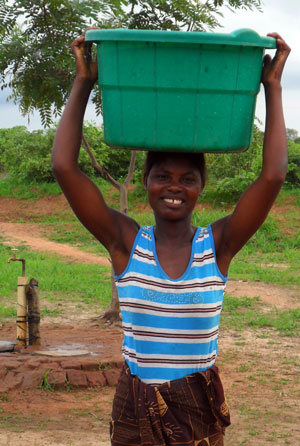Australia Africa Community Engagement Scheme (AACES) Annual Report 2011-12
- Highlights
- Overview
- Key figures
- Delivering WASH services to marginalised communities and schools
- Promoting safe hygiene practices
- Building capacity for community, local government and private sector in WASH services
- Challenges
Case study:
Highlights
Lucia Chivambo from Madjuva community in Mozambique showing the hand washing system in her newly constructed latrine. Photo:Rebekah Enoch/AFAP
Mozambique
Concern Universal, in collaboration with other agencies, successfully advocated for sanitation to receive a higher profile and therefore greater resources in the new Niassa Provincial WASH Plan for 2013.
South Africa
Oxfam's partners launched a research project on the Community Led Total Sanitation (CLTS) approach. This research has the potential to influence the type of sanitation methodologies that the WASH sector is implementing in Southern Africa by determining whether they are appropriate to the context.
Tanzania
Caritas developed a paper on National Water Policy implementation which was presented to district government officials and politicians. The paper emphasised the need for sustainability and raised issues relating to communities' contribution and water user fees. Despite opposition from some politicians, user fees were accepted by communities and resulted in greater financial security for the district's water schemes.
Through influencing policy, as well as advocacy activities, WaterAid and other partners worked with the Ministry of Education and Vocational Training to obtain approval for the National School WASH Strategy. The approval and adoption of the Strategy will guide the implementation of school WASH programs in Tanzania.
Zimbabwe
AFAP's partner, CTDT, worked in collaboration with the Rural District Council's Environmental Health and Hygiene Department and, in consultation with the communities developed a latrine design that is appropriate for people with disability. The design was approved by the Ministry of Health and Child Welfare in early 2012 and construction has commenced.
Overview
Access to safe water, sanitation and hygiene is one of the main development challenges in Sub-Saharan Africa. The region is the furthest 'off track' from the Millennium Development Goals (MDGs) target on water and sanitation,9 with more than 40 per cent of people lacking safe drinking water, and more than 70 per cent lacking toilets and hand-washing facilities.10 Water, Sanitation and Hygiene (WASH) is a central component of the millennium development agenda. The rationale for AACES WASH programs is based on recognising that without significant improvements in access to water and sanitation, as well as to improved hygiene practices, the MDGs related to child mortality, primary education, disease reduction, hunger and poverty eradication will not be achieved. Challenges leading to poor water and sanitation services frequently stem from a lack of priority given to the WASH sector and the consequent lack of allocation of financial resources. Inadequate access to safe water creates a huge burden in communities particularly on women and girls who bear the burden of fetching water for their households. From data collected in 25 countries in sub-Saharan Africa, it is estimated that women in these countries spend at least 16 million hours each day collecting drinking water as compared to men who spend 6 million hours.11
Key figures
A schoolgirl in Malawi demonstrates how she adds ash to the new school eco-sanitation 'sky-loo' toilets constructed as part of WaterAid's AACES project. Adding ash and soil to the pit after use prevents smell and flies, and helps turn the waste matter into valuable compost which can be used safely as fertiliser. Photo: Tsitsi Singizi/AACES Resource Facility
AACES programs provided safe WASH services to communities in 2011–12
- an additional 42,000 people were able to access safe and sustainable water
- more than 18,500 people now have appropriate sanitation
- more than 8,000 hand washing facilities were constructed.
Interventions supported by Oxfam, WaterAid, Australian Foundation for the Peoples of Asia and the Pacific Ltd (AFAP) and Caritas successfully improved access to WASH for communities through using local skills and structures as well as practical and easy-to-maintain technologies. Program activities comprised a combination of water and sanitation supply service delivery, such as boreholes, hand pumps, latrines, and piped water systems. Other components included the promotion of policy development, capacity building to institutions delivering WASH services, and raising awareness on hygiene in communities and schools. Through a combination of strategies, use of strengths-based methodologies and building of effective partnerships, AACES successfully provided increased access to safe water and improved sanitation and increased community awareness of safer hygiene practices.
Key areas of support included:
- delivering WASH services to marginalised communities and schools
- promoting safe hygiene practices
- building capacity for community, local government and private sector in WASH services.
Delivering WASH services to marginalised communities and schools
In 2011–12, 42,000 people had improved access to sustainable and safe water and 18 500 to appropriate sanitation as a result of activities undertaken by program partners. These included the construction and rehabilitation of water supply and sanitation facilities. Improved access to clean water brought a range of benefits to communities, particularly to women and girls who previously had little time for productive activities because of time spent carrying water. It also had a positive impact on young girls' school attendance. In addition, many communities reported reduced numbers of diarrhoea cases.
Increased access to safe drinking water
Significant efforts were made to deliver safe water to marginalised communities. In some remote areas, communities were sharing their domestic water sources with animals or relying on unsafe open wells. AACES partners rehabilitated existing neglected water supply infrastructure or constructed water points where these did not exist. The provision of safe water has positive spin-off effects such as increased income from horticulture and market gardening activities.
AACES partners in Ghana, Malawi, Mozambique, South Africa, Zambia and Zimbabwe supported the construction of boreholes and rehabilitation of water points. For instance in Ghana, WaterAid successfully drilled and rehabilitated six boreholes and two water kiosks, providing more than 6,000 marginalised people (3719 of these being women) with safe water. The communities that were assisted were either peri-urban dwellers or rural inhabitants living in extreme conditions of poverty.
Improved access to sanitation
For women and girls in particular, sanitation facilities are important for their dignity and safety. In Mozambique, AFAP's partner, Concern Universal, constructed 120 family latrines that are benefitting 900 men and women. In Ghana, WaterAid assisted over 1,350 people to gain access to sanitation through the construction of pit latrines because of strong community involvement in the AACES project.
School sanitation
Project partners also focussed on supporting and constructing improved sanitation facilities in schools, recognising that most rural schools lack these. Improved sanitation aims to foster healthy and safe school environments that protect children from disease, abuse and exclusion. For example, in Tanzania, WaterAid built 11 latrine blocks for girls and seven blocks for boys, including latrines designed for pupils with disabilities. The sanitation facilities also included changing rooms to provide girls with private space and in the process promote menstrual hygiene which is expected to not only improve hygiene but also school attendance of girls. A total of 6,917 pupils (3,578 girls and 3339 boys) use these facilities and teachers in project schools have reported improvements in the attendance of pupils, especially girls who previously had missed school during their menstrual period.
Promoting safe hygiene practices
Beneficiaries of a water point constructed as part of AACES in Malawi. Photo: Tsitsi Singizi/AACES Resource Facility
While improving access to safe water and sanitation facilities leads to healthier families and communities, health benefits are significantly increased when people also practice good hygiene. AACES partners increased awareness and demand for sanitation and hygiene service in schools and communities through hygiene promotion activities.
Schools play a central role in promoting hygiene. In Tanzania, WaterAid reached over 11,000 pupils with hygiene promotion activities. Pupils learned about the importance of good sanitation and hygiene through school WASH clubs where they were taught about the importance of good sanitation and hygiene through songs, games and drama. Promotion of good hygiene in schools is rooted in the belief that pupils who are taught to improve sanitation and hygiene are conduits for carrying those messages far beyond school walls, bringing lasting benefits not only to pupils, but also to families and the wider community. Improved awareness of sanitation and hygiene was reported in communities adjacent to program schools, demonstrating the positive knock-on benefits from children's involvement in AACES school WASH programs.
Hygiene promotion in communities was also promoted through training and community dialogue. In Mozambique, Concern Universal provided training to help communities understand the need for, and adopt, safer sanitation and hygiene practices. There was dialogue on current practices in the communities and question and answer sessions resulted in suggestions for practical measures for improvement.
Building capacity for community, local government and private sector in WASH services
A central strategy for improving access to clean water and sanitation is strengthening the capacity of local government, community structures and the private sector to deliver and manage services on an on-going basis. This was undertaken by AACES partners through improving the planning and management capacity of local authorities and community structures. In Tanzania, local stakeholders were assisted to implement their WASH activities more effectively and inclusively through school WASH research, guidelines and toolkits shared by WaterAid.
In South Africa, Oxfam's partners worked with stakeholders in local municipalities on the findings of baseline surveys and infrastructure mapping carried out as part of the program. This helped improve coordination in service delivery by clarifying the roles and responsibilities of stakeholders such as water authorities, government officials and traditional leaders. Government officials visited project sites to review water infrastructure and meet community members. Information gathered from these visits has been useful in ensuring community involvement in planning, management, and maintenance of the WASH infrastructure.
In Malawi, 15 water-point committees with a combined membership of 310 (186 females and 124 males) were re-established with the support of AFAP's partner, Concern Universal. The committees have become more effective after receiving training in community-based management, which has enabled communities to coordinate better and contribute resources towards maintaining water facilities.
Increased community engagement in water and sanitation
Young children in a remote village in Malawi can now access clean drinking water as a result of WaterAid's AACES project which is rehabilitating a broken-down piped water system. Photo: WaterAid
Communities have become more assertive in demanding their water rights and have lobbied decision-makers to influence changes around water and sanitation services after receiving training from NGOs. For example, in Dowa district in the central region of Malawi, CADECOM successfully worked with communities to advocate and negotiate for water rights which resulted in WASH priorities being included in the district plan. Oxfam's partners in South Africa12 also helped build the capacity of civil society and communities to increase their understanding of WASH rights and be more effective in influencing change. Over 6000 people participated in program activities for hygiene awareness, and are now better equipped to engage constructively with government departments and traditional leaders around the supply and maintenance of WASH services.
Different technologies, such as cell phones and geographical information systems, have been tested to map functioning and non-functioning water sources. These reports and mapping documents provide highly useful information for communities to effectively engage and lobby community and government leaders.
Oxfam's partners in Zambia13 trained over 790 community members in Participatory Rural Appraisal methods. The training enabled them to participate in baseline surveys in 12 communities in Mongu district, collecting information directly relevant to their development needs. This exercise provided an opportunity for communities to engage directly with decision makers and to participate in defining solutions to community problems. Oxfam convened meetings at the national level, such as the NGO WASH Forum, which provided a valuable forum to highlight local issues.
Equity and inclusiveness
A wheelchair user in a remote Malawi village proudly shows visitors his new wheelchair accessible toilet constructed a part of WaterAid's AACES project. Photo: Tsitsi Singizi/AACES Resource Facility
A key priority for NGOs was ensuring that marginalised people acquiresufficient knowledge to assert their rights effectively and participate actively in decision-making. For example, in Tanzania, people with physical disabilities in the village of Endashang'wet successfully influenced the location of water points to suit their needs after participating in awareness-raising and training activities undertaken by Caritas.
In South Africa, Oxfam worked with affected communities and local stakeholders to design and implement WASH facilities that met the needs of people living with HIV and AIDS. The process also increased women's knowledge of WASH rights and encouraged their participation in shaping solutions affecting their day-to-day lives. In addition, information collected during the process enabled a gender analysis of program benefits and prompted AACES partners to adjust their programs to cater more effectively to the needs of both genders.
AACES partners also shared information with other stakeholders to support the provision of additional gender-inclusive services. In Zambia, baseline surveys undertaken by Oxfam's partners captured different priorities amongst men, women, and people with disability. For example, men considered the construction of latrines and dish-racks unimportant whereas women held different views. Women wanted water sources to be closer to reduce the time taken to collect water. Women, girls and people living with disability wanted to be included in deciding where to locate new water points.
Another area of focus was improving the representation of women and other vulnerable groups in community structures to give them greater influence in decision making. For example in Malawi, Concern Universal required that women comprise 60 per cent of members in the water-point project committees that it supported. Their participation not only improved management of the water resource, as women make extensive use of community-based water points, but also enhanced their status as valuable members of their communities.
Partners also worked to improve the inclusion of people with a disability. In Tanzania, WaterAid produced a policy brief to draw the attention of policy makers and education stakeholders to the special needs of people with disability. In Mozambique, Concern Universal promoted the 'Nothing About Us Without Us'14approach, the objective of which was to improve awareness on the needs of people with disabilities. Together they highlighted the challenges faced by people with disability and advocated for more inclusive services, such as ramps for schools, health facilities and latrines.
Challenges
Although progress was made in the area of WASH in 2011-12, erratic rainfall patterns in regions of Tanzania and Ghana negatively affected water quantity and quality. Other challenges included the slow integration of people with disabilities into the WASH program and limited capacity among some local partners. Development of relationships with government and other stakeholders was also slow and time consuming.
In Ghana, WaterAid drilled deep boreholes and wells to address the problem of water quality. AACES partners are increasing consultations with Disabled People's Organisations and have recorded progress in supporting suitable WASH designs to integrate people living with disabilities. Oxfam is working closely to improve the ability of partners who had no previous experience of implementing WASH programs. As for cultivating better relations with government, partners have realised that flexibility and a good understanding of the workings of government at the local, provincial and national levels is important in building stronger relationships.
The Experiences of Agnes Kanyamula, Resident of Nkota Kota District village, Malawi
Restoring dignity through rehabilitation of water points
Agnes Kanyamula. Photo: WaterAid
For 14 years, residents of a village in Nkota Kota district village, Malawi have had to walk many kilometres in search of water. The deterioration of the Mwansambo Rural Piped Water System resulted in the drying up of their local water point.
'We would spend many hours fetching water because of long queues as there were many other villages experiencing similar problems. As such we could not do other household chores and getting enough water for daily needs was even a challenge,' says Agnes Kanyamula (31 years).
'We experienced conflict and ridicule with women from other villages where we drew water as they accused us of failing to maintain our water sources. We lost our dignity.'
The rehabilitation and expansion of the system under the AACES project has improved access to safe water and has helped to restore the dignity of Chilemba residents through capacity building activities. Between September and December 2011, 29 water taps were repaired in this village and surrounding villages. WaterAid and its partners have worked with the community to establish a maintenance fund and water point managerial committees. Thirty-year old Loveness Sande notes that the repair of the piped water system has also improved overall wellbeing in the homes. "We now spend more time with our husbands and children and this has brought so much joy to our families."
9 Goal 7C: Halve, by 2015, the proportion of the population without sustainable access to safe drinking water and basic sanitation, http://www.un.org/millenniumgoals/environ.shtml
10 UNICEF & WHO, Progress on drinking water and sanitation: 2012 update, 2012 pp.7 & 17. http://www.unicef.org/media/files/JMPreport2012.pdf
11 Ibid. p.31
12 Maputaland Development and Information Centre, Save the Children KZN, Fancy Stitch, Tholulwazi Uzivikele, Woza Moya, Resources Aimed at Prevention of Child Abuse and Neglect, Community-Based Rehabilitation Education and Training for Empowerment, and Choice.
13 Peoples Participation Services, Keepers Zambia Foundation, Mongu Trades Training Institute, Mongu Municipal Council, Kaoma District Council, and the ministries of Education and Health in both districts.
14 'Nothing About Us Without Us' is a concept used to communicate the idea that no policy should be decided by any representative without the full and direct participation of community members affected by that policy.




